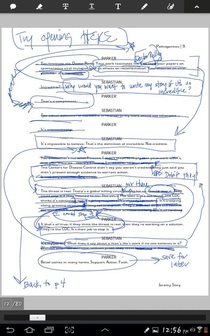 One of the key components of writing a great play is rewriting. Writing IS rewriting; it's a phrase tossed around as one of the tenets of storytelling in this modern age. Many a creative writer would probably agree with this. Playwrights have editors too. They're just called something else. And we couldn't do this without them. Who am I talking about? Plays are written for the stage, they are designed to be performed. By people. Usually out loud. Spoken. Orated. By actors. To an audience. Back when stories were handed down over campfires and around tables at the local public house, the stories evolved over time to make them better, more enjoyable, more understandable. Like the storytelling of old, plays are stories designed to be shared with a crowd of people. Yes, we have more storytellers working collectively at the same time thanks to a stage full of actors, but the idea is the same. A play needs to be read aloud, and eventually staged, to engage the "editors" that the playwright has access to. We call them actors, directors, and dramaturgs. They are one huge part of the new play development process. We'll get to the other part in a moment. For anyone reading this who has never been part of new play development, here is one quick example: a writer brings in a script, actors read it aloud, and anyone in the room offers feedback on what they just heard. Writer then takes script and then, after processing feedback, rewrites. Rinse. Repeat. Ideally, this process leads to production. Until then, playwrights need this collaborative environment and feedback to help determine what stays and what goes. While, in the end, the playwright is the ultimate authority on what words end up in the script, I'm a firm believer in readings. The voices in your head only go so far because plays aren't meant to be contained in your head. They need voices from actors. For years, I've bribed many an actor with pizza or Jimmy Johns to read my words. Every one of them were helpful. There is, however, a diminishing return on just readings. Eventually, you need more. Plays need actors, yes. They also need input from directors. From creative staff. They need the help of a theater. Since last September, I have had the joy of working on my new play, PATHOGENESIS, with the talented folks at Tennessee Repertory Theatre in Nashville. As part of the Ingram New Works Lab, I've been able to bring in pages, scenes, and drafts to their writers' room and hear my words interpreted by their amazing actors; I've received feedback from those actors, my fellow writers, and the artistic staff at TNRep. PATHOGENESIS is a father/daughter play set at the end of the world. A three-hander, the third character wasn't working at the start---his impact on the father and daughter story wasn't clicking; he is one example of a character that has significantly changed during this workshop process. Changed for the better. On top of the feedback, workshops like this one have the added benefit of offering invaluable education on the craft. I'm not the only playwright in the room, and when another writer shares work and receives feedback, that feedback can illuminate me as much as the other writer. On top of that, thanks to the set up of TNRep's program, I've had the immense pleasure of getting to know and receiving one-on-one feedback from this season's Ingram New Works Fellow, Doug Wright. If it wasn't enough that he's a master of the craft with a Pulitzer and a Tony, the man is also wicked smart, generous, kind, and inspiring as a person. Needless to say, with all that support over several months, PATHOGENESIS has evolved and developed. But we weren't done after the monthly development meetings. Now, in the past week, we took a gigantic leap forward. While the months of readings and feedback were essential in crafting the play to this point, TNRep has stepped it up in advance of the Ingram New Works Festival. Like the play evolves, so too does the method of rewriting. At this point, I can only speak for myself. If you follow Tennessee Rep on Facebook or check out their blog, you'll meet Nate Eppler, Andrew Kramer, and Dean Poynor. The plays they're writing are hysterical, poignant, surprising, and a large number of other adjectives that add up to "must see". Each of us has taken to working with our festival team separately, so I'm looking forward to seeing how the last few weeks have treated their work. For me, where I used to listen to a reading, hear feedback from the room, and go home and write, the process is now more entwined. Recently, I had the pleasure of meeting my festival cast, the wildly talented Brian Russell, Evelyn O'Neal Brush, and Patrick Waller; and my awesome director, Christopher Bosen. I tout them here, not because I'm trying to talk them up, but because our two in-depth rehearsals last week were instrumental in taking PATHOGENESIS to the next level. We spent the better part of eight hours over two nights going through the script, working the scenes as if we were heading into production. In essence, we are. The Ingram New Works Festival, while not fully staged, is still a series of plays that are rehearsed, directed, and presented to an audience in order to tell a story. We might not have sets or costumes (and right now, we don't need them), but we have the words and we have actors and directors that work with us, in the room, giving us the chance to experiment with dialogue; to hear how something sounds coming from one character verses another; to play with striking lines to let emotional beats play out between actors. The fact that I still have eight more hours coming up with these people next week? Priceless. Not all writers enjoy rewriting in the room. I love it. I love the give and take between writer and actor. I love the insight a good director brings. By the time one of my plays is nearing public display, I've lived with it for ages. I know it. Almost too well. I know the backstories, I know the subtext, I know the characters like I know my friends and family. I like to think I do. The fantastic part about an in-the-room workshop is that the actors and director can approach it like any future company. They don't have all the answers, but they'll have questions. The actors are focused, each on their role---a wonderful gift as they can help fine tune a character arc and the character herself. The director is pouring over the script looking for the story that needs to be told. This is extremely valuable as a good director will alert you to the stories you're telling (some that you never meant to tell). Having this additional playground in the weeks leading up to the festival is another reason I know Tennessee Rep gets new plays and gets that playwrights need support to bring a play to life on stage. For those already doing new play development, I'm preaching to the choir and not sharing any state secrets, but for anyone who doesn't enter the equation until the public reading, I think it's great to understand how much went into the script and development up to that point. Maybe it's a festival where this is the first read anywhere and thus it's like those first days in the room; it's new to everyone. However, if it's like the Ingram New Works Festival, then there are months of internal readings and workshops where the play is protected and nurtured and it evolves to get it to this public reading. To get it to the next stage of development. The final part of this equation, the part that I'm equally excited by and anxious about, is the audience. Having access to actors and development staff is amazing; TNRep follows through by making sure that all that work is seen. Is heard. As I said, plays are meant to be staged and performed for an audience. We take advantage of the talent in the room to edit our scripts along the way, but this is still a development festival and so the talent in the room includes the audience. I am looking forward to seeing how the audience reacts to PATHOGENESIS. We---and by "we" I mean any theatre company working to rehearse and stage a play (new or established)---have the luxury of living with it for months before an audience sees it. We get to debate character motivation and author intent and why we'll light it in cold hues instead of warm ones. An audience? They get one night. 90 minutes, maybe two hours. Maybe there's an intermission to discuss what's going on, maybe the audience is on the ride from curtain to curtain. It's one chance to tell a story. So for me, this last stage is crucial, thrilling, and terrifying. My hope is that when my play is presented to an audience, that I've articulated my story in the best way possible; that I've given my actors and director the blueprint they need to go out there and make theatre. But it doesn't stop here. My goal is to see PATHOGENESIS move on to a production and full staging. So, I'm counting on these first audiences to go with me on this journey and through their feedback, continue to polish and better the play to the point it is ready for that production. That's the best part of the development process---the development audience gives you your first insight into what works and what doesn't. They offer feedback, and not just at the end. You see it in when they lean in because they're literally on the edge of their seats; you see it when they check out and read the program; you hear it in their laughs, or their gasps, or in focused silence. I'll be listening for feedback and opinions after the show, but I'll be paying attention to real-time reactions during the reading just as much. We may write plays to say something about life. Or we write to be artists. I write for those things, but I also write plays for audiences---whether those audiences are the actors, directors, the theater staff, or the honest-to-God audience that paid to see a night of theatre---so I'm partial to listening to what they have to say. This season has been a wild ride and I'm thrilled to have the chance to share this play with Nashville audiences (and, if all goes according to plan with technology, the world, as several of the plays will be livestreamed). I hope you'll join me and everyone at TNRep for this year's festival!
The full schedule of plays
Obviously, I hope you'll see Pathogenesis, but know that Good Monsters, Cut it Out, Together We Are Making a Poem in Honor of Life, and Posterity are not to be missed! Trust me. They are well worth your time. It has been a pleasure and an honor to see them all develop. my cosmonaut was "hilarious"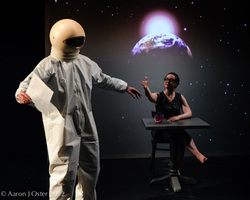 Photo by Aaron Oster Earlier this year, I mentioned that one of my plays had been picked up for a night of 10-minute shorts in Philly. Sadly, I wasn't able to get to the run because the festival overlapped with our year-end festival at OU. As luck would have it, someone along the way in this great developing society we call humanity invented the internet; and because of that, I was able to see photos from the show just moments after opening night closed. That's one of them to the left. A great shot from my director, Aaron Oster, who also went to OU (as a directing MFA student). Aaron and I have never met outside of Facebook. Maybe by email, but really, Facebook is where it's at. He sent me this pic (and some more) and I'm thrilled to see it realized this way. And happily, I wasn't the only one. In a review from Stagemagazine.org, my play THE COSMONAUT IN HUMAN RESOURCES was deemed one of the night's "most hilarious." I shared that honor with a fellow writer named Sean Christopher Lewis, who I've had the pleasure of meeting and whose work I admire greatly. Pretty sweet to be named alongside him (in full disclosure, we were also called out in another review for being too political or something or other -- but hey, once again lumped in with SCL, not gonna complain). Thanks to the folks at Luna Theater Company for putting my play into the Identity Crisis Festival (it was called something else in the previous post, but went up with the identity crisis theme). Always an honor. If you're a playwright (or probably any writer for that matter), you may have at some point submitted your work to a contest, a festival, an agent, a theater, or some guy on the street holding a sign that read "Will act for food." It's how I got my start and began building a body of work. But how do you know when and where to submit? I wondered that myself. There are tons of submission opportunities out there from various theaters. It was hard to keep track. So I created submissioncalendar.com.
New play development is a tricky beast. Right now, the paradigm is submissions. Query letters and pages of scripts being flung across the country in the hopes that amid the stacks of new plays out there, mine will garner the attention of a literary manager or two. Underneath the veil of full-on submissions, there are ample opportunities for new work to be showcased in festivals, contests, and similar development generators that theaters do throughout the year. Some theaters use submission windows and contests as the way to find new work. That's where submissioncalendar.com comes in. To help me keep track of all the opportunities, I created a calendar. That calendar was shared with fellow playwrights. Soon after, it grew; and then, while working with one my mentors, Erik Ramsey, the idea for submissioncalendar.com was born. While I had been building this calendar for a while, the idea of making a public site for all playwrights took shape one afternoon in my MFA playwriting seminar at Ohio University. As we articulated the need for a one-stop shop listing submission opportunities in order of their deadlines, I decided to take the calendar public. For the record, listing submission opportunities is not a new thing. A few wonderful resources do similar things. NYCplaywrights blogs about opportunities for NYC-based writers. The Dramatists Guild offers their members access to listings. There are many others that do the same -- generally geared for their readers and members. What I didn't see out there, however, was the calendar. Listings yes. Blog posts sorted by date or subject, sure. For me, however, it was easier to open up the Google Calendar and look to see what was coming up in an easy-to-read, monthly layout. So --- if you're a playwright and into submitting your work to these festivals, contests, workshops, and the like, then visit submissioncalendar.com and look around. It's free and my goal is to list as many opportunities as possible. I'm also tweeting from @submissioncal if you're twitter-inclined, sending out friendly reminders and sharing news on new play development as I see it happening. The paradigm of submissions is the current one -- but there are those who are looking for ways to bring technology into the mix and figure out how to create a new one-stop that brings theaters and playwrights together with databases, profiles, etc. A sort of playwrights facebook, although that's simplifying (or maybe polluting) the intent. Take a read on this howlround.com post by Gwydion Suilebhan that asks us to consider a new way of connecting playwrights and producers. Until then, submissioncalendar.com is going strong and I hope you'll check it out and spread the word to your fellow playwrights. Good hunting. Fall quarter at OU has wrapped and break is already whipping by at speeds akin to something inside the Large Hadron Collider. In a month (roughly), Winter quarter commences and my next workshop will be tapping me on the shoulder as I sit at my desk and ask for my next draft. So I ventured to the Northeast for a short break from the break, to get some perspective, and find some inspiration on the streets of Boston. While here in the town o' beans (they love it when you call it that), I have submitted several 10-minute plays to a few festivals coming up in 2012. And I've found myself up until the wee hours talking narrative structure with two talented playwrights who happen to be equally amazing friends. But one of the highlights thus far happened the past two Mondays when I had the pleasure of guest speaking at playwriting classes at Boston University. These students are fortunate to have playwrights like Lydia R. Diamond (who is opening Stick Fly on Broadway right now) and Jaclyn Villano as their teachers, so I wasn't sure what I could offer them going in. On the ladder from novice to successful playwright, I'm only a so many rungs above these students. And then, while there alongside fellow writer Michael Parsons volleying questions about productions, play submissions, and seeing your work read for the first time... I saw it. It was hope. Excitement. Sparks of passion. We discussed the writing process, self-producing, networking, and a myriad of things that I've been working hard at for several years now on my journey and at that moment, I wondered if the guest speakers that have come to my MFA program see that same hunger and thrill in my eyes while they share their own experiences. It's invigorating. 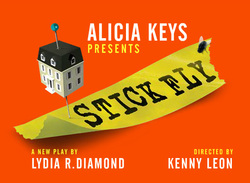 _Then, last weekend, I was surprised with tickets (and a trip) to New York to see previews of a new Broadway play about to open: Stick Fly (which officially opened this past week). Ms. Diamond's new play, produced by Alicia Keys and rocking a cast of actors I've admired for some time (Dulé Hill, Tracie Thoms, Mekhi Phifer, Ruben Santiago-Hudson) and some new faces (Rosie Benton and Condola Rashad -- who was brilliant, by the by), was one of those "this is where I should be tonight" moments. So, I'm standing on this ladder. I know I'm not at the bottom, just as I know I'm not at the top. And I'm standing there in the Cort Theater, looking at this beautiful set, on a Broadway stage, people filling the house for tonight's preview, and I wonder to myself "how far up the ladder am I seeing tonight?". And right then, at that point, I remind myself that it's more important that I know that I'll get there, and not pressure myself with a "when" attached to it. Another thought that raced through my head as the lights came down was "this will be awesome when it's my turn." Smack in the middle of my MFA program, it was a wonderful gift from my friends to get a reminder of why I'm spending so many hours at my laptop destroying my already poor posture. The whirlwind NYC trip topped off with a morning brunch in Brooklyn (well, actually, later there was pizza at Pelham Pizzeria -- which was amazing, but I digress). And at this brunch were some folks who, in the summer of 2011, had journeyed across the pond to Scotland for a little festival you might have heard of. It was there, in the town of Edinburgh, that they premiered a play called Unanswered, We Ride --- written by my dear friend Jaclyn Villano. 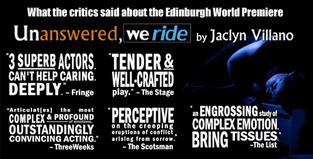 This is a play that I've seen grow from the start and had the honor of directing in a concert-reading workshop at the Last Frontier Theatre Festival in Valdez, Alaska in 2010. That's where Theatre Daedalus met Joy Barrett. I won't go into the details, but between Jaclyn and Joy's combined passion, the play continued and was workshopped privately in NYC, previewed at 59E59's East to Edinburgh Festival, and premiered in Edinburgh to stellar reviews. And now they, like many plays (as Stick Fly once did) are planning the next step. Unanswered, We Ride will see publication and more productions, I'm sure. It's one of those plays that hits you at the core and connects on some inherently human levels (which is truly what all good plays do --- they let us see ourselves on stage). As we discuss marketing and next steps with Jaclyn, Joy, and their team as we sit on park benches and take in the New York harbor and Statue of Liberty (which is wildly inspiring for any conversation), I'm taken back to the class discussions we had with those students at Boston University. _When they asked how they can get produced, how they can get themselves to Broadway, the discussion included the usual things all playwrights and creative teams work with. The play begins somewhere. Maybe a festival or workshop. It gets attention. It moves to something bigger. Maybe a reading in NYC or Chicago or Seattle. Perhaps it hits the fringe circuit. Perhaps it's picked up by a regional theater. From there it moves again, maybe this time to something Off-Off Broadway, or even Off-Broadway. Some get to Broadway, some to the West End. Some peak Off-Off or at Regional, and find publication and life back in the Regional's, and then community theatre. It's a unpredictable journey. You're staring up this ladder... all those rungs... but before you can climb up, you have to go sideways and back again. Then up. The off to another chance of exposure over here (sideways again) before another climb -- the path to the top is never direct. And you oft feel like a crab walking up a ladder. Tricky, yes, but not impossible (and if some scientist who specializes in crustaceans tells me it is impossible for a crab to ascend a ladder, I'll politely tell that squint to shut up and go with my theatrical representation).
I remember being those students. Just as I long to be Jaclyn taking a show to Edinburgh, and Lydia opening at the Cort with an all-star cast & creative team. So I sit here today, about to hop over to Final Draft and put some more words on digital paper, and I smile because I'm not at the bottom. Sure, I'm not on Broadway (yet) and I know that maybe two people read this blog at this point in time; but I've seen my work in workshop, in small productions, and even on the big screen. And I also know that every playwright starts where I am right now. With an idea. A character. And a blank piece of paper. So I sit down to write, as I've always done, knowing that I'm on the ladder, and it's discussions like the ones I've been having with those around me that give me a better idea of how to climb it.  Hey playwrights, theatre go-ers in general, and anyone who ever wanted reality TV audience voting to merge with theatre... a troupe in my hometown of Columbus is presenting a run of one-act plays that they've come up with, but with a twist. Over the four week run, audiences will vote off a play each week. AND, if you want to see more of the play, you have to come back each week to keep it going. And here's why... The first week, they'll put up the first 10-minutes of five one-acts. After an audience vote, only four plays will advance to week two where they'll get their first 20 minutes performed. Again, the audience votes, and one gets the chop. By week three, you'll have three one-acts, and each will play for 30 minutes... and then you vote. The top two plays will make it to the finals (week 4), where they finally get to play out in their entirety (40 min) and last audience vote will determine the ultimate one-act play of "Divide & Conquer." Should this experiment go well, I expect this to become a new MadLab tradition. I am simultaneously fascinated and disturbed that reality competition is making headway into theater --- wondering if this will a) pick-up steam beyond MadLab, and b) inspire writers to be more engaging from the top of the piece all the way through, as they can't rely on those last fantastic 10 minutes to sell the show. To be fair, when sending out submissions to any competition, literary agent, etc., you're basically experiencing this very phenomenon behind-the-scenes, where the readers have hundreds of scripts and if your first 10-page block doesn't hook them, why keep reading? So, yeah, this is kind of that, but on a large scale, with actors, and audience. This is what I'm wondering and asking... should we be excited? Should we applaud the merging of these worlds? Would more events like this help expose more writers (rather than two writers getting a full run of an evening of one-acts, five writers get their name out there, albeit briefly for some)? Does embracing reality TV style competition into theatre acknowledge the changing wants of our audience -- specifically the next generation who are being raised on entertainment where they have a voice? Or does it devalue theatre as an art form by pandering to that audience? Art is often done to express something by the artist, to make us think, and to be more than entertainment. More than what the audience craves. So what do you think? Would love to get your thoughts on this. From my end, I'm still torn. It's a slippery slope... I wouldn't want all theatre to evolve to this -- however, the competitor in me thinks it would be fun to play, and I know that as someone who wants to write for television as much as the stage, you only get that first impression to keep your audience from changing the channel. And don't forget, to anyone who cries foul of this (and I welcome you to do so; I love discussion on emerging theatre), a producer's job is to put people in the seats, so while the art is important, so are ticket sales and something like this, mixed into a season line-up, might just get some new blood into the house. Should MadLab hold another 'Divide & Conquer' next year, I'll be submitting. Would you? You can read more about MadLab's show (which opens this week), at http://madlab.net/MadLab/divideconquer.html |
Jeremy's blog
Thoughts. From my brain. Anything to do with how we tell stories and the stories we tell each other. Literally and figuratively. About JeremyWriter. Husband. Father. Effulgent dreamer. A Fightin' Irishman (@NDdotEDU '01). A playwriting Bobcat (MFA in Playwriting, @OhioU '13). I write plays. I'm a geek. I wanted to be an astronaut. I go places in my head.
Categories
All
Archives
January 2022
|

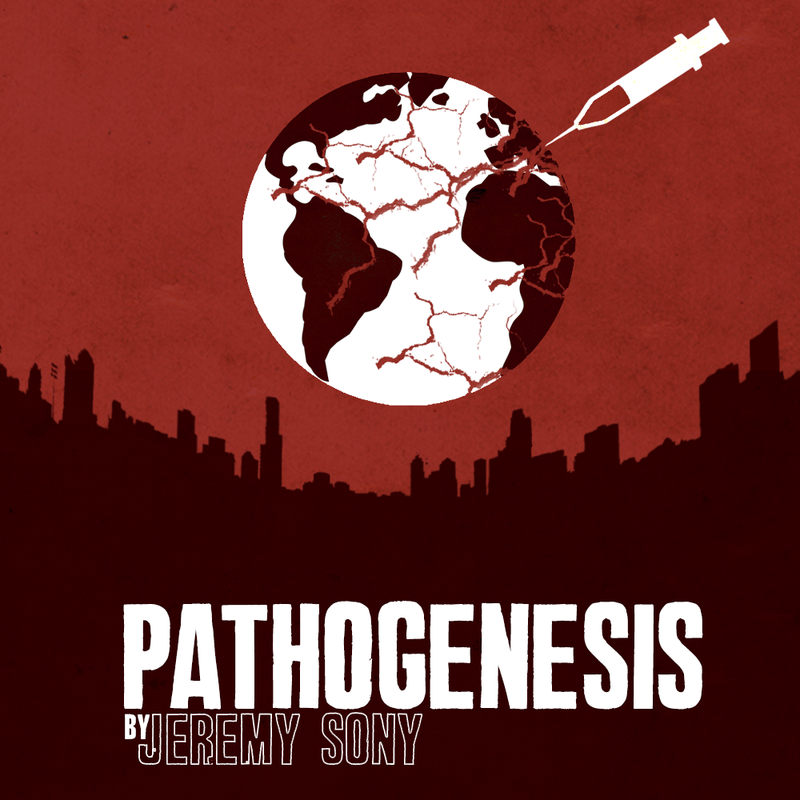
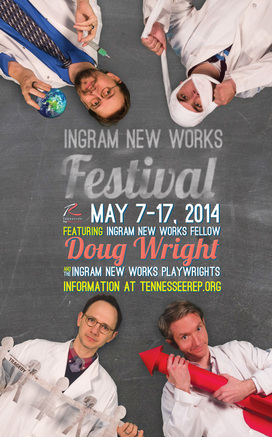
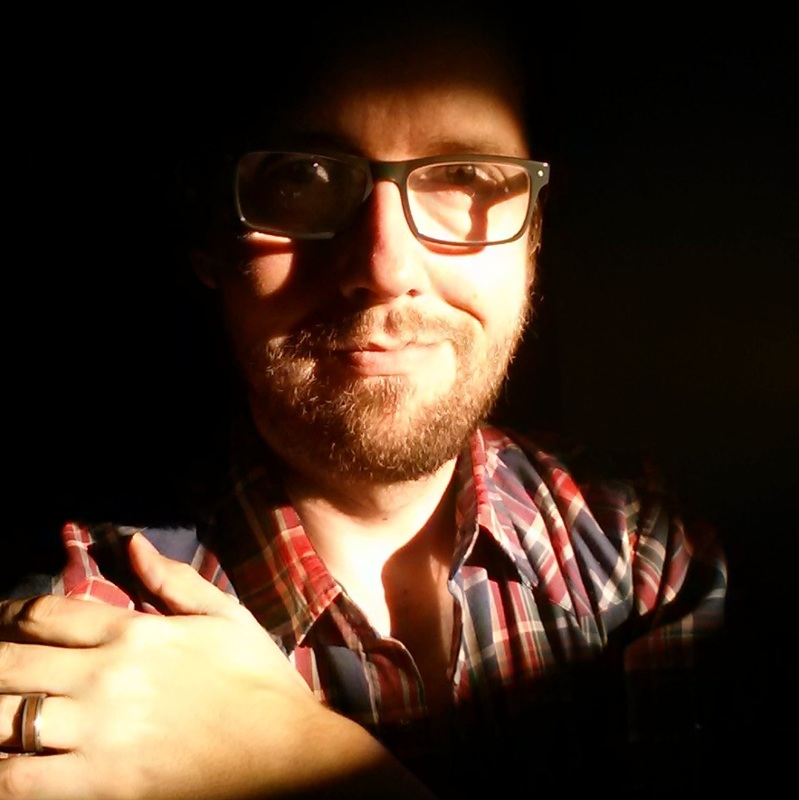
 RSS Feed
RSS Feed
